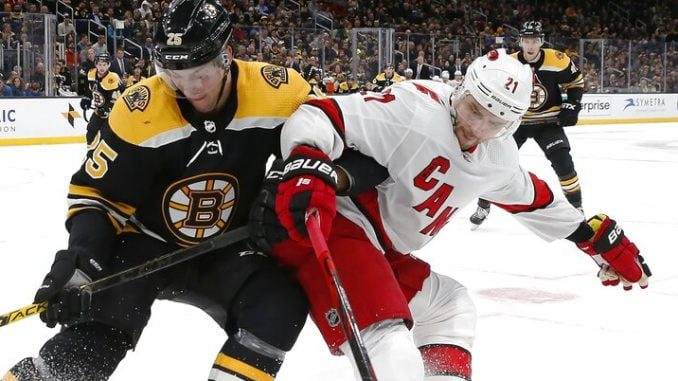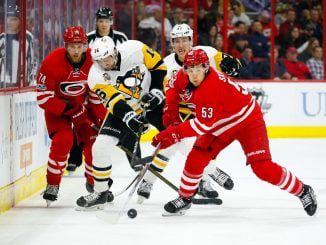
There are plenty of reasons the Carolina Hurricanes look better prepared to face the Boston Bruins in this year’s Stanley Cup Playoffs than they were more than a year ago when their Cinderella run ended with a four-game sweep to the longtime Eastern Conference powerhouse.
Yes, the Hurricanes are a year older, a year wiser and more battled-tested. The Bruins, who are captained by the NHL’s oldest player and have three 30-somethings among their four top-scoring forward, are also a year older.
And then there’s the more current concrete evidence: Carolina ushered the Rangers out of the Qualifier round in three straight games, trailing for just 3:06 of the 180 minutes played; Boston never led in losing all three of its round-robin games.
The Bruins’ top line of Patrice Bergeron, Brad Marchand and David Pastrnak totaled just one point — a secondary assist for Bergeron against Tampa Bay — in those three losses. The Hurricanes, meanwhile, got seven of their 11 goals and 15 points in all out of their trio of Sebastian Aho, Andrei Svechnikov and Teuvo Teravainen.
Carolina also had the advantage of playing for something in its three games, facing elimination in the Qualifier series, whereas Boston was essentially skating in glorified exhibitions that only determined seeding for a tournament in which no team will have a true home-ice advantage. The Hurricanes also haven’t played since last Tuesday, so any edge could be replaced by some rust.
“Let’s be honest, we were playing for something and those teams really in the top-four seeds were just trying to get to this point healthy,” Hurricanes coach Rod Brind’Amour said Monday of any advantage Carolina might have. “So they weren’t playing for near as much. So there would have been maybe a little advantage there, but now I think that probably went away with us sitting for a week.”
So how do we evaluate and break down this series? It’s only logical to look at the players and the changes made since the two teams — which played only once during this regular season — met in last year’s Eastern Conference Final.
Carolina’s forwards vs. Boston’s forwards
There are some new — and impactful — faces on the Hurricanes’ front line compared to a year ago. Lucas Wallmark and Greg McKegg have been replaced by Vincent Trocheck and Morgan Geekie. That’s an upgrade, even if we call Geekie-for-McKegg a wash.
Micheal Ferland — by that time a shell of the player he was at the start of the 2018-19 season — is gone and replaced by Martin Necas, who will probably be the fastest player on the ice in the series and an emerging threat on the power play. Carolina will also have a healthy Jordan Martinook, who played Games 1 and 2 against the Bruins last year on one leg before sitting out on his way to offseason surgery. Ryan Dzingel was scratched in the Rangers series but is available.
The Bruins’ biggest loss up front from a year ago is 2019 trade deadline acquisition Marcus Johansson, who had 11 points in 22 playoff games a year ago, including four points in the opening two games against Carolina. David Backes’ hefty contract is gone, while Danton Heinen was traded to Anaheim in February.
Boston got back Nick Ritchie in the Heinen trade, and the former 10th overall pick brings size to the Bruins’ bottom two lines but little scoring.
When healthy, Ondrej Kase — the return in the Backes trade that also sent Boston’s 2020 first-round pick to Anaheim in late February — can be a game-changer. Like Trocheck with Carolina, Kase struggled to mesh in his brief time with Boston before the shutdown. Anders Bjork played just three playoff games in the Bruins’ run to last year’s Stanley Cup Final, but he had 19 points in a bottom-six role this season.
Analysis: Carolina has improved its talent and depth from a year ago, and its young stars have all improved. This gap isn’t as wide as a year ago.
Carolina’s defense vs. Boston’s defense
Boston’s defense is mostly the same, anchored by Zdeno Chara, Torey Krug, Brandon Carlo and Charlie McAvoy. Connor Clifton and Matt Grzelcyk return as bottom-pairing options, and 23-year-old Jeremy Lauzon is the new addition.

The Hurricanes’ blue line is stronger than ever, especially if Dougie Hamilton — who missed the Rangers series with an injury — is ready to play. While Justin Faulk is gone from last year’s team, Carolina has added three defensemen who have averaged 20-plus minutes a game during their career in Jake Gardiner, Brady Skjei and Sami Vatanen, along with 2019 Stanley Cup winner Joel Edmundson.
Carolina will certainly miss the injured Brett Pesce, but if Hamilton returns Brind’Amour will be in a position to have two of Edmundson, Haydn Fleury and Trevor van Riemsdyk as extras — a luxury few teams can boast.
Analysis: Not having Pesce is a huge hole, but if any defense is equipped to slow down a high-powered offense, it’s Carolina’s.
Carolina’s goalies vs. Boston’s goalies
Much is the same here with one exception. James Reimer is now in the Hurricanes’ 1B spot occupied by Curtis McElhinney a year ago. While the 37-year-old certainly has more years under his belt than Reimer, Carolina’s current goalie has more NHL experience with 120 more regular season games and twice as many playoff starts (eight to four).
The Hurricanes could go to Reimer, but Petr Mrazek is still the odds-on bet to be the Game 1 starter. Boston coach Bruce Cassidy said Monday that Tuukka Rask will start the playoff opener for the Bruins, but Jaroslav Halak is a fine alternative should the B’s need him in the series.
Analysis: A franchise goaltender always gives you an edge, and Rask is surely still hungry to win his first Stanley Cup. Carolina’s goaltending is a wild card, but Mrazek and Reimer easily — and surprisingly — outplayed Henrik Lundqvist and Igor Shesterkin in the play-in series with the Rangers.
Series outlook
This first-round matchup could very well come down to special teams. Carolina’s were good in the Qualifier round, specifically the penalty kill, but taking a lot of penalties (13 PIMs per game in the Rangers series) against the Bruins is a death sentence. If the Hurricanes can stay out of the box or at least match Boston’s output on the power play, their 5-on-5 depth should be enough to win the series.
That said, it’s hard to look past a team with as much continued success as Boston. Last year I picked Carolina in six games and was horribly wrong. But my gut tells me the same thing this year.
The pick: Carolina in 6



